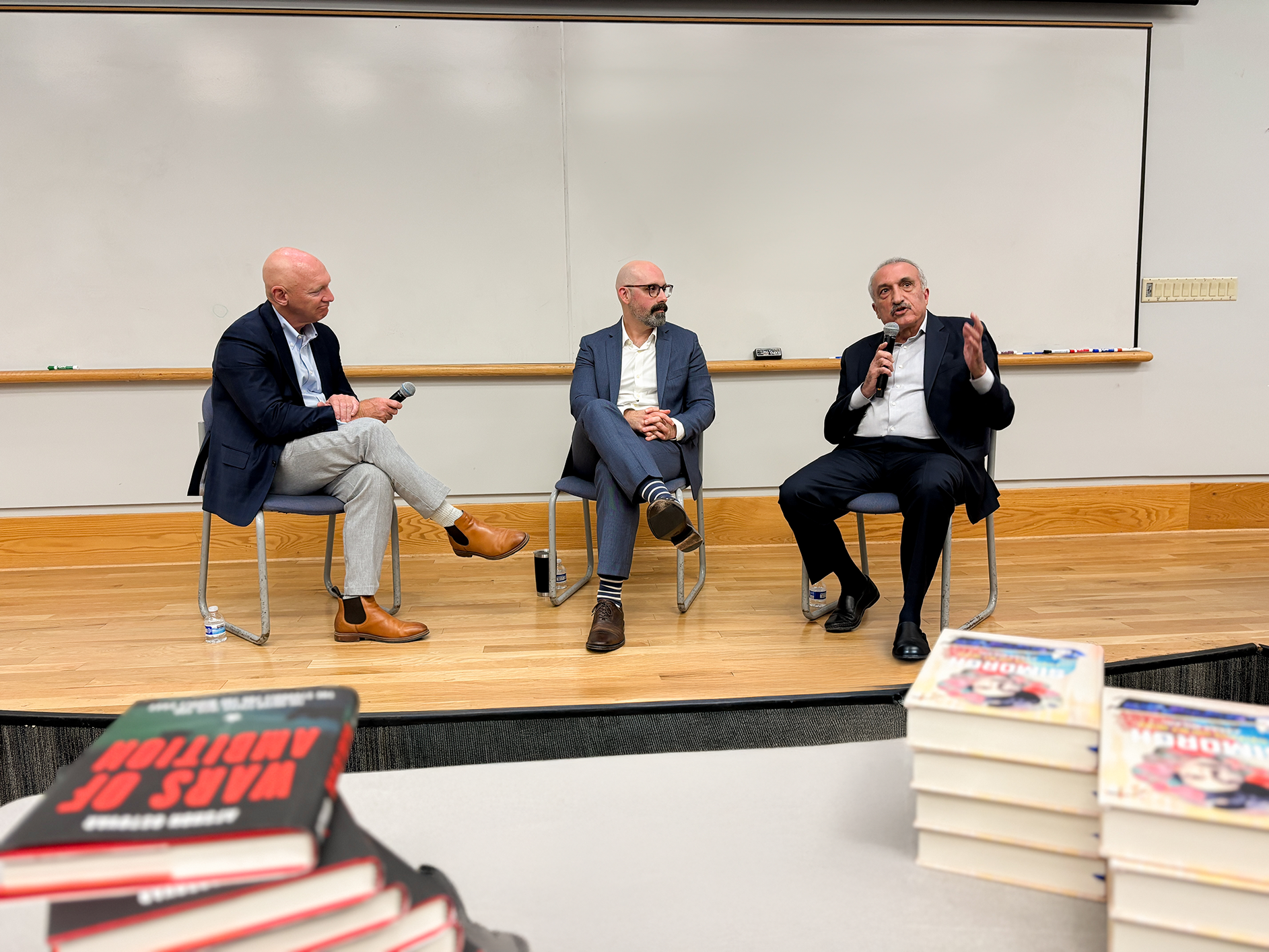
Against a backdrop of recent events, evolving regional tensions and shifting perceptions, the Naval Postgraduate School Foundation hosted a Fireside Chat on August 7 on “Understanding Iran.” The event featured notable experts Dr. Afshon Ostovar, associate professor and associate chair for research in National Security Affairs at the Naval Postgraduate School, and Dr. Abbas Milani, research fellow and co-director of the Iran Democracy Project at the Hoover Institution and director of Iranian Studies at Stanford University. The discussion, moderated by NPS Foundation Executive Vice President Todd Lyons, examined how these forces are shaping Iran’s internal politics and its role in the region.
The program opened with introductions including Lyons’ reflection on his time as a Middle East Foreign Area Officer (FAO), describing NPS as an “inflection point” between what he could do before and what he could do after graduating.
Ostovar, a historian and national security scholar whose research focuses on Iran and the region’s strategy and politics, spoke about his work examining the interplay between ideology, power and military strategy in shaping the country’s actions. He explores this in his recent book, Wars of Ambition, which analyzes U.S.–Iran security dynamics from 9/11 to October 7, 2023.
Milani discussed his decades-long career in Iranian studies, his personal experiences living and working in Iran, and his newest work, Simorgh: Portraits on My Mind, which blends personal experiences and historical reflection. He also shared how he was always impressed by his interactions with young military professionals like the NPS students in the audience sometimes even challenging his and his Stanford students’ preconceived ideas about the military, noting their humanity, humility and depth of thought. This theme of challenging assumptions, especially when generalizing about a people, carried throughout the discussion.
The speakers described Iran’s internal reality as culturally vibrant yet constrained by authoritarian controls. Milani said the regime has fully failed to instill its ideology in younger generations, with society becoming more secular than ever before and women “more at the center of political and cultural life than ever.”
From there, the discussion shifted to Iran’s position in the region and its military posture. Ostovar described how, on October 7, 2023, Iran was at the height of its regional influence, but in the months since “almost all of those gains have been reversed,” citing losses to Iran’s deterrence network, including the destruction of air defenses, depletion of missile stockpiles and damage to nuclear facilities. Milani added that the regime is now in “the weakest position it has been in for decades” and may be entering a process of transition, but while Iran’s hard power has taken significant hits, Israel’s actions in Gaza have provided the regime and its allies like Hamas with a political and communications boost, strengthening their narrative even as their military position has weakened.
Both speakers addressed political pressures on the regime from within and abroad. Domestically, they cited generational protests in 2009, 2018, and the Women Life Freedom movement. Internationally, they noted China’s reluctance to back Tehran despite lucrative agreements and Russia’s unwillingness to put its relationship with Israel at risk.
In the audience Q&A, questions turned to succession and the possibility of change after Supreme Leader Khamenei’s death. Both speakers agreed that change must be driven internally by Iranians but that external actors can play a supportive role. They touched on resource issues such as water scarcity and power shortages, and Milani urged the U.S. to help dismantle Iran’s “electronic prison” by enabling secure communications between citizens and external sources.
The conversation blended historical context, geopolitical analysis and personal insight, offering attendees a layered understanding of the complex forces shaping Iran’s internal politics and role in the region.
The rare insights into the region, were especially valuable to the service members who come to NPS to study National Security Affairs. NPS’ distinctive program allows FAOs to dive deep into the culture, politics, economics and security of the regions they will operate in and build a foundation critical to their career and to the strategic interests of the United States.
Events like this Fireside Chat are part of the NPS Foundation’s ongoing effort to create spaces where ideas, experiences and expertise can be shared across the innovation network. These gatherings bring together students, alumni, faculty, military leaders, industry partners and supporters to exchange perspectives and strengthen connections. Learn about upcoming events at: npsfoundation.org/events.